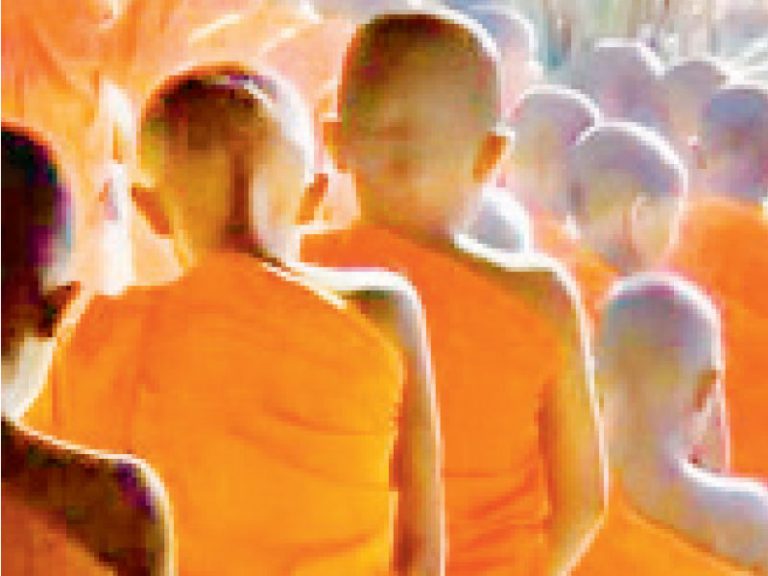Although the abuse faced by children, who are in the care of adults, has come to light, child abuse in religious institutions hardly makes it to the headlines. When someone dares to speak about children, who are subject to abuse in temples, many are offended that reporting such incidents brings the religion to disrepute. Society chooses to remain silent regarding the lives of novice monks (samaneras) who are also children.
This week, it was reported that an eight-year-old novice Buddhist monk, who has been assaulted by three other monks, had been initially admitted to the Gampola Hospital and transferred to the Peradeniya Teaching Hospital, as his injuries were severe.
According to Police, the novice monk, who had only been ordained 45 days earlier, had been set upon by the elder monks due to having fluffed his lines when reciting the sermons during the offering of flowers to Buddha.
The injured novice monk had resided at a temple situated at Pussellewa in Gampola.
The relatives of the novice monk alleged that despite a complaint lodged with regard to the assault on the novice monk, the three elder monks are yet to be arrested and that no statement had been recorded either from them or from the Chief Incumbent of the Temple.
According to the relatives, when they inquired from the Chief Incumbent as to why the novice monk seemed ill and why there were wounds near his ears and head, he had said the novice monk must be suffering from a rash. The Chief Incumbent said he would take the novice monk to the hospital soon.
At the end, the novice monk was admitted to the hospital by the relatives.
In another incident this week, the Aranayake Police arrested 58-year-old monk on allegations of molesting a 16-year-old novice monk who live in the same temple.
The Police have commenced investigations to arrest another monk in the temple for sexually abusing the victim monk.
Cultural shame
It is a sad reality that sexual abuse of novice monks in Sri Lanka has been reported in the past. These incidents have drawn widespread condemnation and concern from both within and outside the country.
In many cases, these abuses have been carried out by senior monks or teachers who were entrusted with the care and education of young novice monks. The abuses have included molestation, rape, and other forms of sexual exploitation, often perpetrated against children.
One of the reasons for the prevalence of these abuses is the lack of accountability and oversight within the monastic community. Many monks and teachers are revered and respected figures in Sri Lankan society, and as a result, their actions may go unquestioned or unreported.
Additionally, there is often a culture of silence and shame surrounding sexual abuse, which can make it difficult for victims to come forward and report their experiences. Many victims may feel that they will not be believed or that they will be blamed for the abuse.
Eternal dilemma over protecting traditions and child rights
When a spate of sexual abuse was reported in Buddhist temples last year, Chancellor of the University of Ruhuna, Ven. Dr. Akkuretiye Nanda Thera said, children below 12 years of age should not be ordained, and headquarters of all Buddhist Nikayas must immediately intervene to protect the rights of novice monks in temples.
“There were immoral monks who engaged in unsavoury activities even in Buddha’s time. That was why various disciplinary rules were imposed on monks. Even today, there are immoral monks like that, but there is no mechanism to monitor them. The headquarters of Buddhist Nikayas do not perform that task. Novice monks too have child rights. If senior monks behave according to disciplinary rules, no abuse will occur in temples,” he added.
The Ven. Thera’s statement came in a backdrop where religious leaders in the country never speak up about the topic.
The hesitation to speak up against child abuse in Buddhist temples is a complex issue that stems from various cultural, social, and institutional factors. In many cases, children who have experienced abuse may feel afraid or ashamed to speak out, while others may not even recognise the behaviour as abusive due to a lack of education or awareness.
